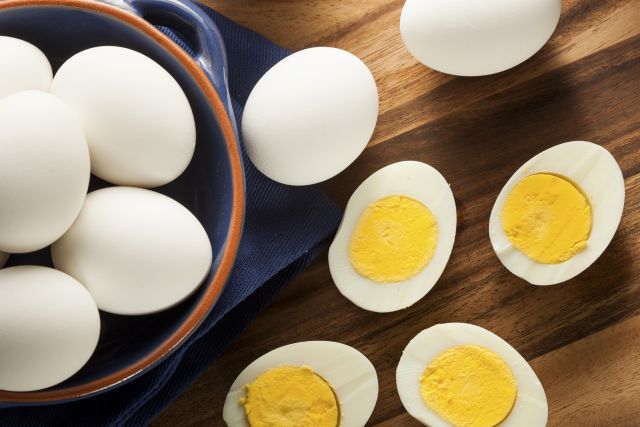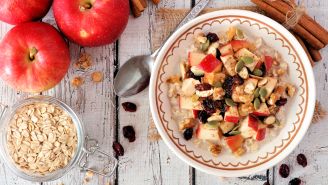Updated on January 19, 2023.
Despite the bad rap that cholesterol-containing foods have received over the years, there is one that many people are reconsidering as part of a healthy diet: eggs. Whether scrambled for breakfast or hard-boiled for a snack, these 70-calorie, nutrient-rich bites offer a number of whole-body health benefits.
Protein-packed and satiating
Getting enough protein in your diet from is important for keeping muscles strong and maintaining a healthy weight. According to the Mayo Clinic, people should get between 10 percent and 35 percent of their daily calories from protein. For an average person weighing 165 pounds eating 2,000 calories daily, that equates to about 60 grams. After the age of 40, people tend to lose muscle mass, so protein intake should increase to between 75 and 90 grams daily.
One hard-boiled egg has about 6 grams of protein, which gets you on your way to meeting those requirements.
The more physically active you are, the more protein you need to rebuild muscles that break down naturally during exercise, particularly during strength training. Eggs have also been shown to reduce the risk of sarcopenia, or the breakdown of muscle mass and strength that occurs with age.
Eating eggs may also help you feel fuller, longer, during the day. A 2022 meta-analysis published in the journal Nutrients found that eating eggs for breakfast can help you feel more satiated when compared to eating a carb-rich breakfast. Another 2017 study published in Nutrients noted lower levels of ghrelin (a hormone that increases appetite) in participants who ate two eggs for breakfast compared to those who ate a packet of oatmeal. People eating eggs consumed fewer calories at meals throughout the day as well.
Antioxidant powerhouses
Not only are eggs a great source of hunger-dampening protein, they're full of good-for-you antioxidants and vitamins.
Researchers at the University of Alberta examined egg yolks produced by hens fed typical diets of wheat or corn and identified two key amino acids in the yellow centers: tryptophan and tyrosine. These amino acids—which are the building blocks of proteins—also have powerful antioxidant properties, which may help reduce the risk of heart disease and even cancer. Two cooked egg yolks, the researchers found, provide about the same antioxidant power as an apple.
Eggs also have lutein and zeaxanthin, antioxidants that may lower the risk of age-related macular degeneration (AMD). This condition, occurring most frequently in people over the age of 75, causes vision loss in the center of the eye that can sometimes lead to blindness. In a 2020 paper published in Clinical Nutrition, researchers studied more than 3,600 people and found those who ate two to four eggs per week had a 62 percent less change of having an advanced form of AMD than those who ate one egg or fewer weekly. After a 10-year follow up, people who ate five to six eggs weekly had a 65 percent lower risk of AMD.
Chock-full of vitamins
Eggs are a good source of a range of other vitamins and minerals, including vitamins A and D, folate, and omega-3 fatty acids. Others to note include:
- Selenium: One egg provides about one-quarter of the daily recommended intake of selenium, a nutrient that helps reduce inflammation and helps keeps your thyroid gland healthy.
- Choline: Eggs are a good source of choline, an important nutrient for keeping the liver and brain healthy. Daily requirements for adults range from 425 to 550 milligrams (mg); one large egg provides 147 mg.
- Vitamin B: Studies suggest that eating eggs may limit brain shrinkage that occurs with aging, thanks to their healthy amounts of B vitamins.
Remember moderation
As healthy as eggs can be for a meal or a snack, they do have one potential drawback: cholesterol. Each egg has about 186 mg, which can be a red flag if you have concerns about heart health. Eating a diet high in dietary fat and cholesterol can increase the risk of both heart attacks and strokes.
For most people, an egg a day is healthy, but you may want to talk with your healthcare provider (HCP) about eating eggs if:
- High cholesterol runs in your family, or you have familial hypercholesterolemia, an inherited condition that causes high cholesterol at a young age.
- You are at a higher risk of heart disease because of conditions like type 2 diabetes or obesity, or if you are a smoker.
- You are getting older. Age increases risk of high cholesterol, particularly for women who are past menopause.
When thinking about including eggs in your diet, you should also factor in how you’ll be eating them. A boiled egg with whole-grain toast and fruit for breakfast will affect your body differently than if they are fried with bacon and a side of hashbrowns.







